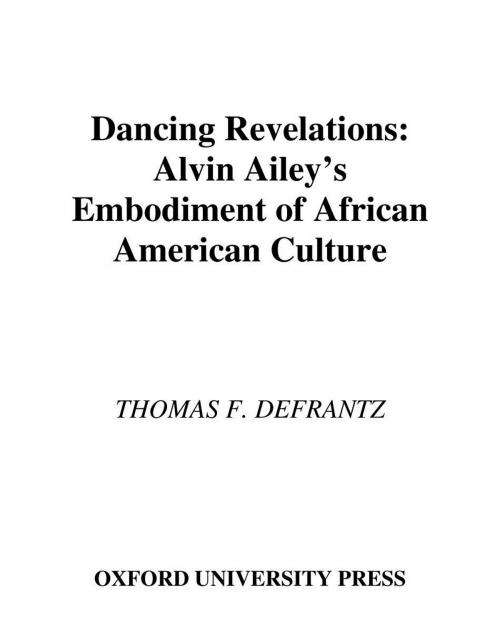Dancing Revelations
Alvin Ailey's Embodiment of African American Culture
Nonfiction, Entertainment, Performing Arts, Dance, Modern, Social & Cultural Studies, Social Science, Cultural Studies, African-American Studies| Author: | Thomas F. DeFrantz | ISBN: | 9780199882434 |
| Publisher: | Oxford University Press | Publication: | January 15, 2004 |
| Imprint: | Oxford University Press | Language: | English |
| Author: | Thomas F. DeFrantz |
| ISBN: | 9780199882434 |
| Publisher: | Oxford University Press |
| Publication: | January 15, 2004 |
| Imprint: | Oxford University Press |
| Language: | English |
In the early 1960s, the Alvin Ailey American Dance Theater was a small, multi-racial company of dancers that performed the works of its founding choreographer and other emerging artists. By the late 1960s, the company had become a well-known African American artistic group closely tied to the Civil Rights struggle. In Dancing Revelations, Thomas DeFrantz chronicles the troupe's journey from a small modern dance company to one of the premier institutions of African American culture. He not only charts this rise to national and international renown, but also contextualizes this progress within the civil rights, women's rights, and gay rights struggles of the late 20th century. DeFrantz examines the most celebrated Ailey dances, including Revelations, drawing on video recordings of Ailey's dances, published interviews, oral histories, and his own interviews with former Ailey company dancers. Through vivid descriptions and beautiful illustrations, DeFrantz reveals the relationship between Ailey's works and African American culture as a whole. He illuminates the dual achievement of Ailey as an artist and as an arts activist committed to developing an African American presence in dance. He also addresses concerns about how dance performance is documented, including issues around spectatorship and the display of sexuality, the relationship of Ailey's dances to civil rights activism, and the establishment and maintenance of a successful, large-scale Black Arts institution. Throughout Dancing Revelations, DeFrantz illustrates how Ailey combined elements of African dance with motifs adapted from blues, jazz, and Broadway to choreograph his dances. By re-interpreting these tropes of black culture in his original and well-received dances, DeFrantz argues that Ailey played a significant role in defining the African American cultural canon in the twentieth century. As the first book to examine the cultural sources and cultural impact of Ailey's work, Dancing Revelations is an important contribution to modern dance history and criticism as well as African-American studies.
In the early 1960s, the Alvin Ailey American Dance Theater was a small, multi-racial company of dancers that performed the works of its founding choreographer and other emerging artists. By the late 1960s, the company had become a well-known African American artistic group closely tied to the Civil Rights struggle. In Dancing Revelations, Thomas DeFrantz chronicles the troupe's journey from a small modern dance company to one of the premier institutions of African American culture. He not only charts this rise to national and international renown, but also contextualizes this progress within the civil rights, women's rights, and gay rights struggles of the late 20th century. DeFrantz examines the most celebrated Ailey dances, including Revelations, drawing on video recordings of Ailey's dances, published interviews, oral histories, and his own interviews with former Ailey company dancers. Through vivid descriptions and beautiful illustrations, DeFrantz reveals the relationship between Ailey's works and African American culture as a whole. He illuminates the dual achievement of Ailey as an artist and as an arts activist committed to developing an African American presence in dance. He also addresses concerns about how dance performance is documented, including issues around spectatorship and the display of sexuality, the relationship of Ailey's dances to civil rights activism, and the establishment and maintenance of a successful, large-scale Black Arts institution. Throughout Dancing Revelations, DeFrantz illustrates how Ailey combined elements of African dance with motifs adapted from blues, jazz, and Broadway to choreograph his dances. By re-interpreting these tropes of black culture in his original and well-received dances, DeFrantz argues that Ailey played a significant role in defining the African American cultural canon in the twentieth century. As the first book to examine the cultural sources and cultural impact of Ailey's work, Dancing Revelations is an important contribution to modern dance history and criticism as well as African-American studies.















